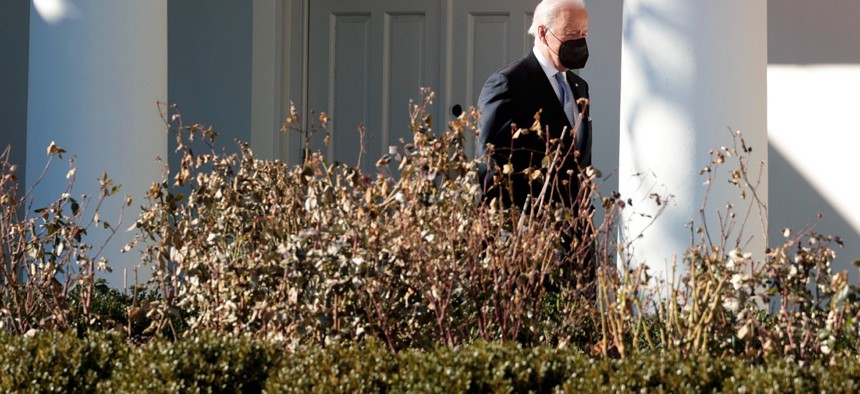
President Biden leaves the White House Friday to spend the weekend at the presidential retreat at Camp David. Anna Moneymaker/Getty Images
Seven States Are Challenging Biden’s $15 Minimum Wage Policy for Contractors
The White House asserted the president acted within his legal purview with the executive order.
Seven states have sued the Biden administration this past week over its new requirement that contractors pay their employees a $15 per hour minimum wage.
President Biden announced this initiative shortly after taking office in January 2021, then followed up with an executive order in April, which commenced the rulemaking process. The $15 an hour minimum wage for contracts covered by the executive order started taking effect on Jan. 30. The final rule also eliminates the tipped minimum wage for federal contractors by 2024, ensures workers with disabilities don’t earn a sub-minimum wage and protects outfitters and guides working on federal lands, reversing a policy from the Trump administration.
On Tuesday, Arizona, Idaho, Indiana, Nebraska and South Carolina filed a lawsuit in the U.S. District Court for the District of Arizona challenging the wage increase.
“The coalition argues that the contractor minimum wage mandate violates the Procurement Act and the Spending Clause of the U.S. Constitution,” said a press release from Arizona Attorney General Mark Brnovich's office. “The Biden administration purports that the Procurement Act grants it the authority to implement such a sweeping mandate. However, in reality, Congress passed the act to provide the federal government with an efficient system for procurement amongst its agencies, not give it unrestricted power over the minimum wage.”
The defendants listed are the Labor Department, Labor Department’s Wage and Hour Division, President Biden, Labor Secretary Marty Walsh and acting Administrator of the Wage and Hour Division Jessica Looman.
The second lawsuit was filed on Thursday by Texas, Louisiana and Mississippi in the U.S. District Court for the Southern District of Texas Victoria Division and has the same defendants as the other one.
“With full awareness of the negative economic impact of artificially raising the minimum wage, and despite his failure to persuade Congress, President Biden chose to ignore the will of our federal legislators and instead forced a raise in the minimum wage through executive fiat,” said the complaint. “Through leveraging the disproportionate bargaining power of the federal government, defendants have decided to coerce federal contractors into abiding by a policy that Congress does not endorse, potentially affecting hundreds of thousands of businesses that employ as much as one-fifth of the entire U.S. labor force.”
In both situations, the plaintiffs pointed out that the Senate in March 2021 rejected 42-58 an amendment to raise the federal minimum wage to $15 per hour.
“The Senate parliamentarian had ruled that the wage increase could not be added to [Biden’s $1.9 trillion COVID-19 aid bill] and approved by a simple majority of senators despite House passage of the provision last week,” Politico reported at the time. “After Senate Democrats stripped it from the Covid package, a group of progressive senators led by Bernie Sanders, I-Vt., forced a vote on the policy change anyway.”
The seven states that filed suit all have Republican attorneys general, and all except Louisiana have Republican governors.
When asked for comment on the lawsuits the Labor Department referred the question to the Justice Department, which declined to comment.
A White House spokesperson speaking on background told Government Executive that the “executive order will promote economy and efficiency in federal contracting, providing value for taxpayers by enhancing worker productivity and generating higher-quality work by boosting workers' health, morale and effort.”
Also, “the federal government’s work will be done better and faster,” said the spokesperson. “The president acted well within his legal authority when he issued this executive order.”







